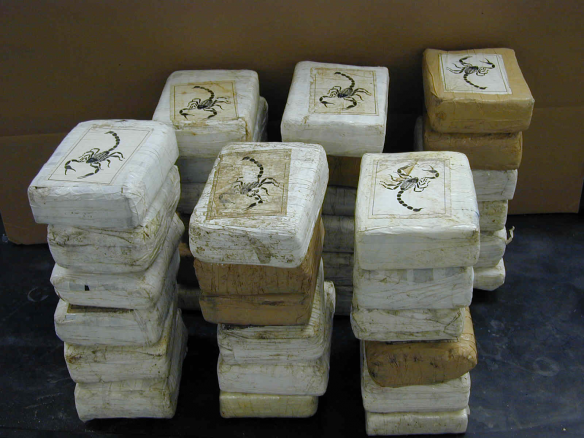Humanitarian actors increasingly look to frame the failure of the War on Drugs as an imperative for renewed engagement in Latin America. When leaders meet at UNGASS 2016 in April, legalization will be central in discussions, but issues of humanitarian encroachment should also be on the table.

Bricks of cocaine, a form in which it is commonly transported. Wikimedia Commons.
In Latin America, the four-decade long War on Drugs has had devastating impacts on the health, safety and wellbeing of rural communities, and imposed de facto states of siege in heavily militarized urban areas where government forces engage narco-trafficking groups. In reflecting on the legacies of disappearances, murders and displacement, the Drug Policy Alliance calls the Drug War ‘a humanitarian crisis of epic proportions’. In October 2015, the Colombian Ombudsman’s Office declared that fighting between paramilitaries over drug trade routes was causing a humanitarian crisis. Such instances reflect how the War on Drugs in Latin America has encouraged a highly militarized yet unsuccessful approach to drug control, leading to violence, displacement and human suffering throughout the region.
Yet contrary to past decades, the War on Drugs is increasingly seen as unwinnable. Seeking a set of plausible post-prohibition frameworks, governments and stakeholders increasingly look to reframe the issue of narcotics trafficking around a human rights and public health centred approach that emphasizes decriminalization, legalization and harm reduction. In May 2013 a pathbreaking report was launched by the Organization of American States (OAS) calling for the legalization of the drug trade, and considerable expectations surround the April 2016 UN General Assembly Special Session (UNGASS) on Drugs.
The War on Drugs and the Humanitarian Frame
Despite their remits and imperatives to offer assistance in times of crisis, humanitarian agencies are businesses that need to economically justify their existence. Here Gilles Carbonnier speaks of ‘the Transformative Power of Humanitarian Crises (2016), and such sentiments are increasingly relevant to how humanitarian organizations are reframing their relevance in the Americas. Facing the decline of civil conflicts and the need for humanitarian intervention in the region, agencies are facing an existential crisis on the continent. In response agencies have increasingly begun to frame the War on Drugs in the language of “humanitarian crises”. The phrase “humanitarian crisis” most often appears in relation to the War on Drugs in Colombia, referencing violent actions by drug producers and traffickers, and the human cost of government prohibition. Yet other contexts are also being labelled as crises. Mexican cartel violence and the State’s war against it is seen to have contributed to a humanitarian emergency; Central American transshipment corridors are viewed as experiencing crises of forced migration and displacement; and flows of unaccompanied child migrants at the US border was described as a humanitarian crisis resulting from the War on Drugs.
- Read more at the blog of ATHA, the Humanitarian Academy at Harvard, where the full text was published 4 March 2016.
- Read more in a recent PRIO Policy Brief: Is The War on Drugs a Humanitarian Crisis?
But if there is de facto siege and large scale disappearance, murder and displacement over a considerable period of time, shouldn’t it be called a humanitarian crisis?